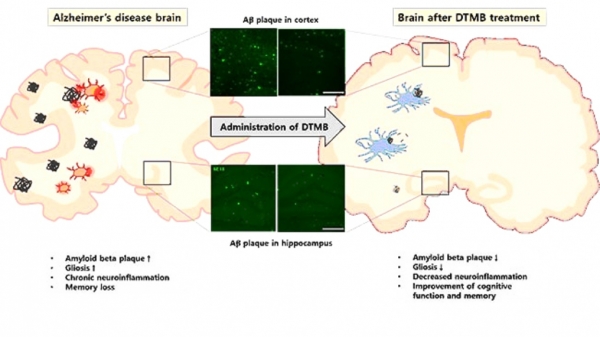
Alzheimer’s disease is a representative neurodegenerative disease. Patients with Alzheimer’s disease and their families continue to suffer while the precise cause of dementia remains unknown.
Professor Kyong-Tai Kim and Ph.D. candidate Eun Ji Oh of the Department of Life Sciences (LIFE) have developed a substance that activates the peroxisome proliferator-activated receptor (PPAR), thereby revealing the possibility of treating Alzheimer’s disease. PPAR is a transcription factor necessary for metabolic regulation and is considered to be an important target protein for the treatment of metabolic diseases.
In patients with Alzheimer’s disease, cognitive function and memory decline as abnormal misfolded proteins form aggregates in brain tissue, and nerve cells are damaged due to chronic inflammatory responses. When insulin resistance increases due to an excessive amount of fat accumulation, metabolism becomes impaired, and chronic inflammation in the body increases. If this phenomenon is coupled with aging, the formation of amyloid-β aggregates in brain tissue is accelerated, which damages nerve cells.
Therefore, the research team focused on PPAR, which has been studied as a therapeutic target for several metabolic diseases, such as obesity, dyslipidemia, and diabetes. Through a drug development platform that simultaneously uses virtual computer screening and cell-based screening techniques, the research team developed a small molecule compound that activates PPAR by confirming its binding to actual PPAR proteins.
Following the oral administration of this compound for three months in mice with Alzheimer’s disease, memory and cognitive function were found to be restored to the same level as in the normal mice.
Additionally, the research team discovered that both amyloid-β aggregates and chronic inflammation in the immune cells of brain tissue were significantly reduced. Prof. Tae Young Roh of the Department of LIFE determined that the expression of inflammation-related genes was suppressed.
Prof. Kim explained, “This research will be of great help to patients suffering from Alzheimer’s disease.” He added, “In the future, we plan to develop a drug optimized for the treatment of Alzheimer’s disease through toxicity testing and structure-activity relationship analysis.” This research was published in the journal, Neurotherapeutics, on Aug. 2.


